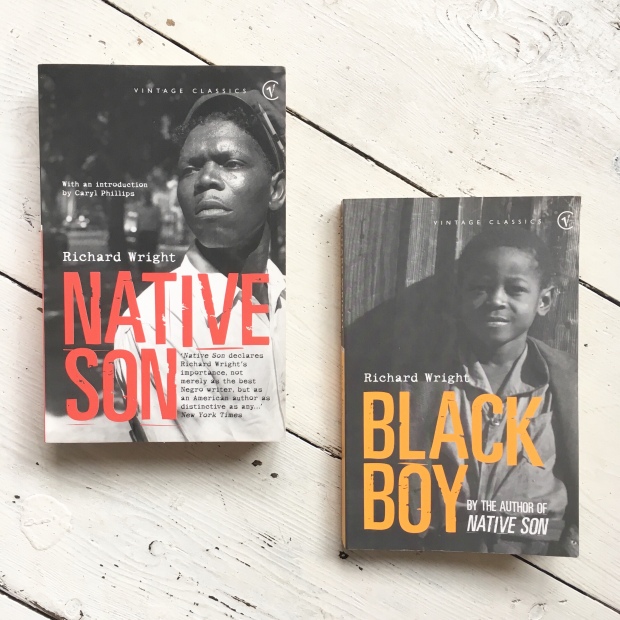
Native Son: 4/5
Black Boy: 5/5
Richard Wright’s Native Son was published on March 1st, 1940 and was the first novel by a black author to be chosen for the Book-of-the-Month Club. It sold an incredible quarter of a million copies in its first three weeks and within five months it had sold half a million copies. The novel tells the story of Bigger Thomas, who lives in one rat-infested room with his family on the south side of Chicago. What unfolds is a series of horrifying events after a desperate act.
“He shut their voices out of his mind. He hated his family because he knew they were suffering and that he was powerless to help them. He knew that the moment he allowed himself to feel to its fullness how they lived, the shame and misery of their lives, he would be swept out of himself with fear and despair. So he held towards them an attitude of iron reserve; he lived with them, but behind a wall, a curtain. And toward himself he was even more exacting. He knew that the moment he allowed what his life meant to enter fully into his consciousness, he would either kill himself or someone else. So he denied himself and acted tough.”
Black Boy was published in 1945 and is Richard Wright’s own account of growing up in the Deep South of America. Born near Natchez, Mississippi, in 1908, Wright lived in Memphis, Tennessee as a child before living in an orphanage and then lived with various relatives. In Black Boy, Wright details a life of moving from home to home and, by the age of twelve, he had received only one year of formal education. Hunger and poverty dominated his life, as well as white subjugation and fear. His dream of justice and opportunity in the north became his focus as he learned to survive in his hostile environment.
“But what strange world was this? I concluded the book with the terrible conviction that I had somehow overlooked something terribly important in life. I had once tried to write, had once revelled in feeling, had let my crude imagination roam, but the impulse to dream had been slowly beaten out of me by experience. Now it surged up again and I hungered for books, new ways of looking and seeing. It was not a matter of believing or disbelieving what I read, but of feeling something new, of being affected by something that made the look of the world different.”
I was lent these books by a work friend and it really is essential that they are read together. In hindsight, I wish I had read Black Boy first as it provides more of an insight into the character of Bigger Thomas. For me, Bigger was a character lacking empathy and demonstrated sociopathic traits. However, reading Black Boy offers an in-depth glimpse into Bigger’s psyche and Wright’s painfully honest account of his own life is quite an indictment of society in America during that period. I loved the energy and flow of Wright’s writing, which made for compelling and immersive reading.
Wright’s turbulent home life influences and shapes much of his writing and after leaving home at fifteen, he worked in Memphis for two years before moving on to Chicago. In 1935, he began to work on the Federal Writers’ Project and in 1938, he published Uncle Tom’s Cabin. He was awarded a Guggenheim Fellowship in the following year. Other titles include The Outsider, The Long Dream and American Hunger. After the publication of Black Boy, Wright left the United States with his wife and visited France as official guests of the French government. They returned to France in 1947 and lived there with their three daughters, with Wright remaining there until his death in 1960.
I was alarmed recently to hear a comment from someone who dismissed autobiographies, implying that they are egotistical and self-indulgent. While I believe everyone is entitled to their opinion, I couldn’t disagree more. Real life accounts can teach us so much about the world, human nature and important moments in history. These books were shocking, provocative and uncomfortable to read, but they were completely gripping and absorbing. I am so glad that I received the opportunity to read these books and they are certainly two that I will never forget.
Have you read these books and did you enjoy them? What is your opinion on autobiographies? Do you think they are important or do you believe they are self-serving? I would love to know your thoughts!